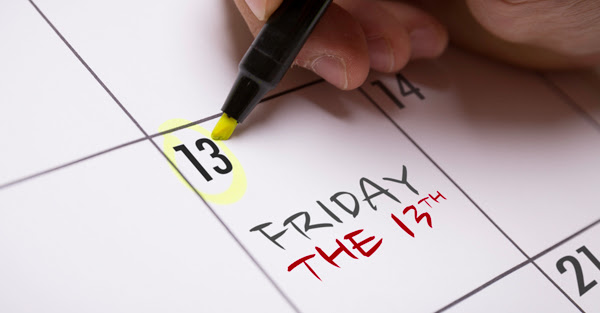
Fact or fiction how it affects your health
Today is Friday the 13th, and like every Friday the 13th, people tend to err on the side of caution. They expect to be unlucky and prepare for all sorts of bad things to happen. The irrational fear is rooted so deep in our history and psyche that high-rise condo towers often do not have a 13th floor because it is less desirable to homeowners. However, life can become a self-fulfilling prophecy, which means something you believe in can cause itself to be true simply by believing in it and adapting your behaviour towards it. In other words, if you believe today to be an unlucky day, it more than likely will be, and if you think bad things are going to happen, they just might. But not because it is Friday the 13th.
There are a few different theories about why this date is said to be so unlucky. The number 13 is considered out of place and odd because we historically can identify with the number 12.
There are 12 months, 12 zodiac signs, 12 gods of Olympus, 12 days of Christmas etc. Another theory is based on bible scripture, where there were 13 guests at the last supper (held on Thursday) followed by the next day, which was the crucifixion.
In 1307, on Friday the 13th, Philip IV of France had members of the Templar arrested. There were trials, torture and many of the Knights were burned at the stake, eventually leading to the superstition of Friday the 13th as a cursed and evil day.
A novel written in 1907 tells the tale of a stockbroker that picked Friday the 13th to create fear and manipulate the stock market, causing it to crash so he could cash in. The novel struck a chord and today still causes real-life superstition among stockbrokers.
Pop culture gave rise to Friday the 13th when the horror movie was released in 1980, which escalated the fear of the dreaded day and the doom that it creates. The media headlines from the past and today also set out to remind us to fear the day and to be wary of bad things, which populates our thoughts even further.
The fear of Friday the 13th is woven so deeply into our lives that science even put a name to the fear. You can choose between “paraskevidekatriaphobia” (Paraskevi meaning Friday in Greek) or “friggatriskaidekaphobia,” based on the word Frigg, the Norse goddess that Friday was named after in English.
You are not alone in your fear
If you find yourself worrying about Friday the 13th approaching, you are not alone, and the stress and fear that this causes for some people is real and impacts their day and their health.
Set out to change how you perceive the day because a lot of good things happen on Friday the 13th, not to mention it is the start of the weekend.
There is very little evidence to show that Friday the 13th is indeed an unlucky day. Many studies have shown that this day has little or no effect on events like accidents, hospital visits and natural disasters. But it does have an impact on your mood, anxiety levels and decision making.
Anxiety can cause an increase in breathing and heart rate, a feeling like you are on guard waiting for something terrible to happen. Anxiety can cause an increase in breathing and heart rate, a feeling like you are on guard waiting for something terrible to happen. The body responds by increasing blood flow to the brain, ready to produce whatever response is necessary. You may feel lightheaded and nauseous, jittery and jumpy. You may be short-tempered, or self-protect and prefer to stay away from people. You may have an increase or decrease in appetite, which is the body’s response to self soothe.
Ultimately, anxiety can manifest in many different ways. The important takeaway is to try to recognize the media’s need for headlines and creating panic and fear is the reaction they are looking for.
Arm yourself with information on the lack of evidence on what Friday the 13th is about and take the opposite approach to the day.
Make it your lucky day.
